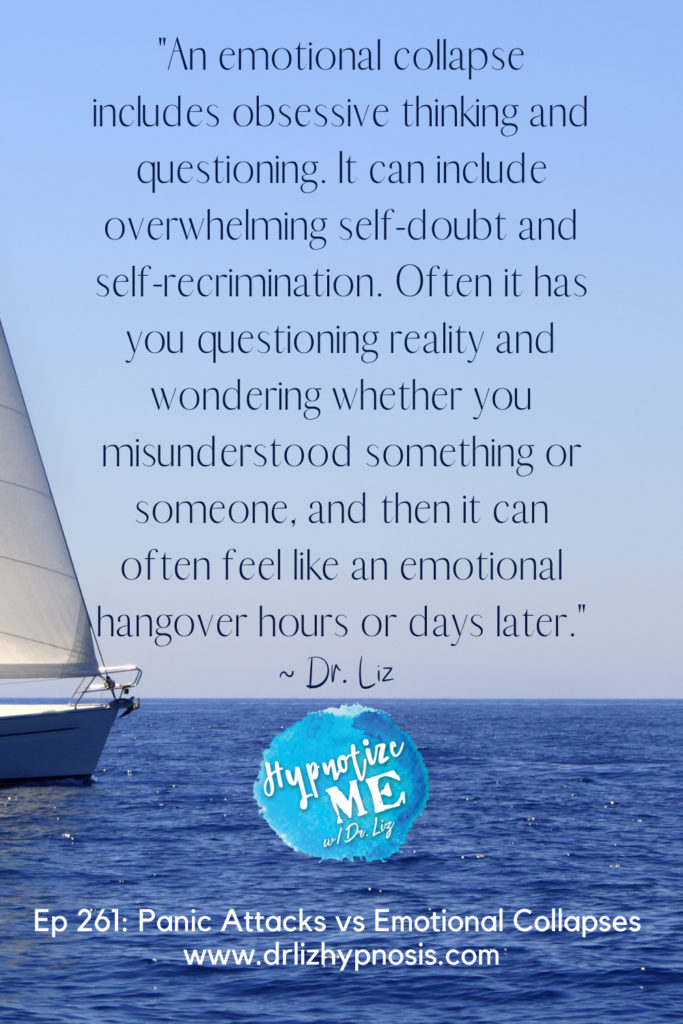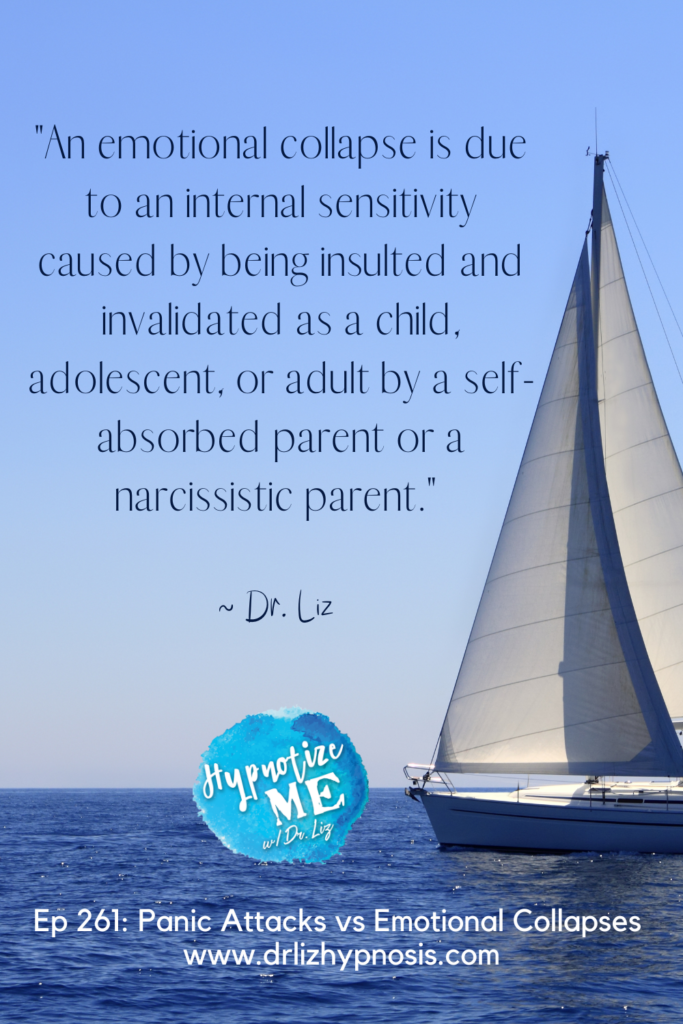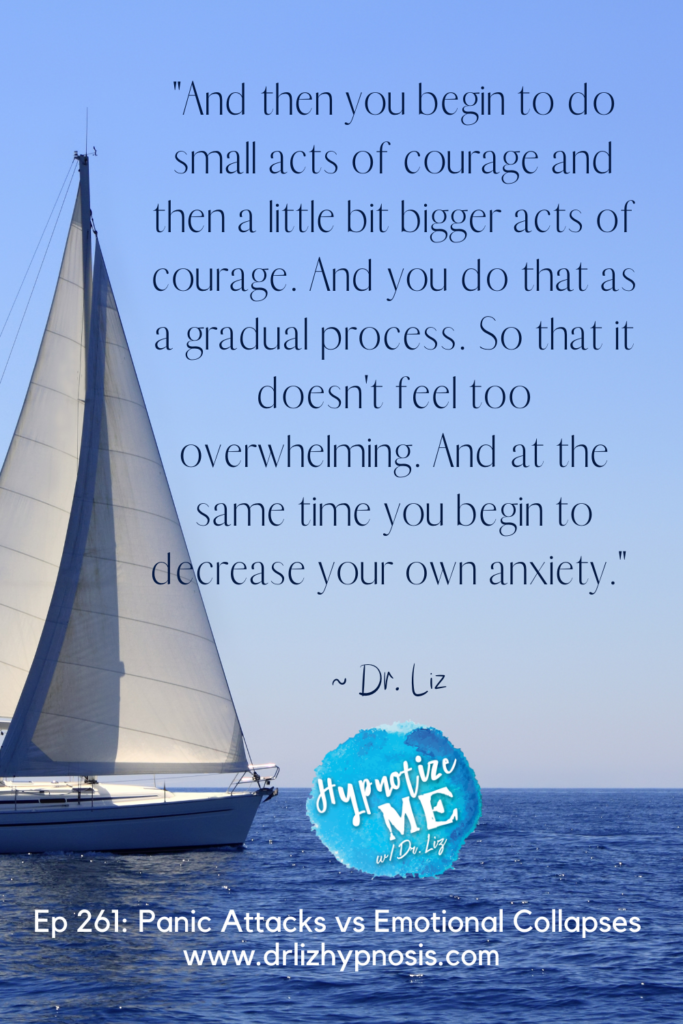Have you ever had a panic attack last several hours or more? Dr. Liz lets you know the difference between a panic attack and an emotional collapse. She gives a whole list of ways to handle an emotional collapse and to reduce panic attacks.
 |  |  |
The books she references are:
“Will I ever be good enough: healing the daughters of narcissistic mothers” by Karyl McBride
“Don’t Panic” by Reid Wilson
“Ask and it Shall be Given” by Abraham Hicks
Free hypnosis files at http://bit.ly/drlizhypnosis
About Dr. Liz
Winner of numerous awards including Top 100 Moms in Business, Dr. Liz provides psychotherapy, hypnotherapy, and hypnosis to people wanting a fast, easy way to transform all around the world. She has a PhD in Clinical Psychology, is a Licensed Mental Health Counselor (LMHC) and has special certification in Hypnosis and Hypnotherapy. Specialty areas include Anxiety, Insomnia, and Deeper Emotional Healing.
————–
Do you have Chronic Insomnia? Find out more about Dr. Liz’s Better Sleep Program at https://bit.ly/sleepbetterfeelbetter
Search episodes at the Podcast Page http://bit.ly/HM-podcast
Help yourself with Hypnosis Downloads by Dr. Liz! http://bit.ly/HypnosisMP3Downloads
———
A problem shared is a problem halved. In person and Online hypnosis and CBT for healing and transformation. Schedule your free consultation at https://www.drlizhypnosis.com.
Listened to in over 140 countries, Hypnotize Me is the podcast about hypnosis, transformation, and healing. Certified hypnotherapist and Licensed Mental Health Counselor, Dr. Liz Bonet, discusses hypnosis and interviews professionals doing transformational work
Thank you for tuning in! Please subscribe to auto-download new episodes to your listening device.
Transcript:
Hi everybody. Dr. Liz here. I am not very regulated today, but I’m going to go ahead and try to record this episode so that it goes out on time and two so that you really hear what that’s like.
I keep it real. Yeah. I don’t always have good days. Sometimes I have a hard time myself trying to get a hold of myself and work is often a way that I actually. Do that is, okay, look, I’ve got to get my mind off of this over here, so I’m going to go ahead and work so that I can focus on something else or someone else.
I think therapists don’t always talk about how wonderful it is to concentrate completely on someone else for 45 minutes or an hour or two hours, depending on how long this session is. Not that the grocery list sometimes doesn’t pop into our head, it does, but it is a certain type of attention that it takes to focus completely on what someone is saying and really attend to that and then run absolutely everything in the background to see what would be most helpful when you respond to them. In doing that, it really is a lovely process.
Even right now, it’s been about two minutes and I’m already feeling calmer because I’m focusing on something else other than the crisis that’s going on. It’s not really a crisis. It’s just like I have this GC that’s not doing his job and I gave him notice of cancellation of the contract.
I talked to the engineer at the city today who basically said, this guy is incompetent. Completely incompetent. He said you can’t call him unqualified because he holds a license. So he obviously passed the test at some point and is qualified, but he is incompetent. So I was like, okay, I wish I had talked to you about four months ago.
The first time the plans got rejected. Um, if you follow the podcast for a while, you know that I have this balcony that leaks into my daughter’s room, and this became a major problem last summer, and so I decide to enclose the balcony. Well, it is a major project that insurance did not cover and it’s cost me a lot of time and expense and it’s not even started.
So back to the drawing board people, it’s upsetting to be six months down the road and have to start over, make decisions again, get new quotes, all kinds of stuff. So that’s what’s been upsetting me. The engineer at the city was so kind and helpful and nice and I really appreciated that. I was so grateful for him really.
Okay. Let’s talk about emotional collapse here versus a panic attack.
What I will sometimes hear as a therapist is that someone had a panic attack for four hours or a whole day. I saw this on a show one time. Which one was it? Love is Blind, is probably the Dating Reality show that I love to bust on. One of the women was having an emotional collapse or what they called it was a panic attack.
They said she’s been having a panic attacks for hours, and she was stuck in the hotel room or a closet of the hotel room, something like that. This has been a while ago, and I thought, oh, because they don’t know what an emotional collapse is, that’s really what happened. She had an emotional collapse, which feels like an extended panic attack, so you get all these same symptoms.
You get the body flush that goes on, a whole physical reaction, like a whoosh over your body. Initially, it does feel like a panic attack. You get the racing heart and maybe you’re the sweating, the derealization where you feel like you’re outside of your body, that type of thing. But a panic attack ends in about 10 to 20 minutes, sometimes 30 minutes max.
An emotional collapse keeps going. It can last for hours sometimes and the emotional collapse includes obsessive thinking and questioning. It can include overwhelming self-doubt and self-recrimination. Often it has you questioning reality and wondering whether you misunderstood something or someone, and then it can often feel like emotional hangover hours or days later.
So that’s an emotional collapse. It typically happens in reaction to a specific incident. Now, this can be a perceived or real betrayal, or humiliation, and or abandonment. Big stuff. People, big stuff.
Sometimes it’s simply perceived as someone misunderstands. Sometimes it’s real. So in the case of the dating show, I think the guy she had, um, Married . . Maybe it was Married at first sight. Do you guys watch that one?
Love is Blind is the one where they’re like in two separate rooms and they share a wall and they can talk to each other through that wall and get to know each other. Then they propose and they meet each other in person like they get to see each other and then they have this dating period before they really get married.
Married at first sight is where somebody else matches them. The show producers, right? or psychologists, whatever, and then they meet for the very first time at the altar. They get married and then they go on a honeymoon immediately and blah, blah, blah. And they have this period where, um, they decide whether to stay married or to go ahead and divorce is probably an annulment at that point, really.
But anyway, those are the two shows. But you can imagine in both of the shows, all kinds of misunderstandings happen.
And in this one, In in the incident. I’m thinking about something that happened where her partner really didn’t invalidate her, where he said something that was, perceived by her as a humiliation. He didn’t truly like her face or body or something like that, so it set off this emotional collapse in her, which made her question everything, everything, the entire relationship. His whole honesty profile, who he was, all of this. Now, if this is starting to sound like a borderline personality disorder, you’re not wrong in that an emotional collapse is very common in BPD, but you guys know that. I often say you can be in recovery from BPD as well, and I think it’s very treatable to the point where someone doesn’t meet the criteria and we’re going to talk about how to regulate an emotional collapse today. Okay? I’m not going to leave you hanging here.
She was questioning everything. That is often what happens with an emotional collapse where all of a sudden you’re questioning maybe the whole friendship that you have with someone, or the whole interaction where you’re going over what they said, what you said, all of this, and then starting to question whether you remembered it correctly.
So all of this happens very, very quickly. Boom. The woosh goes over your body and you feel like you’re having a panic attack and you start questioning everything. Now, what’s going on here?
Really, an emotional collapse is due to an internal sensitivity caused by being insulted and invalidated as a child, adolescent, or adult by a self-absorbed parent or a narcissistic parent.
Now that happens all the time. If you have an NPD parent, they pretty regularly invalidate their children whatever age they are, or often outright insult them.
I remember going home when I was pregnant with my first daughter. I had gained a lot of weight and when I stepped off the airplane, the first thing my mother said to me was, God, how much weight have you gained?
Like, like that. Okay. She was insulting me. She did not say, I’m so happy you’re pregnant. I knew you didn’t even think you could get pregnant. . Um, she didn’t say, I’m so happy to have a grandchild and nothing. That is just one example of, um, the type of insults that NPD parents give, but back to the injury.
The injury by the other person in adulthood triggers a momentary regression back to the feeling they had in childhood. So it’s these old memories or sensations that make the current situation feel much bigger than it truly is. So you’re triggered, it’s triggering something old in you. This feeling where you thought you knew what reality is. But all of a sudden that’s turned upside down.
Back to the show example, the woman thought that this person was attracted to her and wanted to be with her and had this initial woo. and then something he said invalidated all of that and made her question if he was even attracted to her at all and maybe he said something like, oh, I like your hair up instead of down.
Or something smaller. Something small like that. Maybe that’s not so small, I don’t know. But it wasn’t anything like, I’m not attracted to you. It was just all these thoughts started going in her head where the reality sort of got turned upside down because it was triggered by something from childhood.
Now, the instinct of the person having the collapse is to reach out for external validation, ask someone else to make them feel better. Sometimes obsessively so. So this may be the person who emotionally injured them. It may be a partner, a friend, a therapist. It can sometimes be a stranger that they meet.
If you’ve ever run into someone that all of a sudden launches into this detail about an incident, sort of inappropriately then it may be someone who’s having an emotional collapse and inappropriately doing that. Not really knowing whether the person they’re talking to is truly trustworthy. . Now, if this happens frequently, then the person that you reach out to can often feel burned out by the emotional collapses.
So this may be the friend who’s always in crisis, always calling you. You always have to talk them down. And I will say that this was me for many years. I was the friend having the crisis.
I have really good friends and I keep them for a very long time, so I have worked hard to create balance there. But I would say that when I was less regulated and would’ve had a diagnosis of BPD that this happened quite often where I’d have to call a friend and they’d have to like talk me off the ledge.
There was one night when I felt really suicidal. I was never going to do it because I had children by that point, but I went over to a friend’s house so that she could just babysit me, like being there with me because it helped me feel more regulated because she was more regulated.
You know, you’ve heard them talk about mirror neurons in the brain and how we mirror the person across from us. Often it is not communicated that the person with the healthier level of emotional development and regulation and growth can regulate the person who’s less. So this is definitely a factor of therapy that is not discussed that often.
The therapist in the room is hopefully further along the path and more emotionally regulated than the client in the room. And so what happens is the client upregulates to the therapist.
Spouses can do this for each other as well. Good friends can do this for each other.
But back to burnout. If this happens too much and you’re not engaged in an active process to really get a handle on your own emotional regulation, on your own emotional collapses, the other person can start to feel burned out, and then this will re-trigger a feeling of the original person of being, a burden of not knowing reality.
Because often kids with an NPD parent grow up feeling like they’re a burden instead of truly a gift, which I consider my children truly a gift to me.
Now, that was a lot about what it is, what it feels like, what’s going on, like what’s the theory behind it.
And you guys, this material is based on the book by Karol McBride.“Will I ever be good enough: healing the daughters and narcissistic mothers”
So I put it in my own words, but originally it came from her and she does a lot of work in the area of narcissistic mothers. I have a whole video series about narcissistic mothers that is based on her book. If you want to go look on YouTube for it.
So what are the options here? What can you do to help yourself if you realize you’re in an emotional collapse?
- Reaching out for support is a normal, natural thing to do. So if it feels okay, reach out to a person who’s safe to share your feelings with.
- Go someplace that feels good, like a friend’s house or somewhere in nature.
- You can ground physically by placing your feet on the ground or walking outside, repeating, I am safe. I am not in danger. I am okay. Or something along those lines.
- You can distract yourself like I did today. I wasn’t having an emotional collapse. I was just feeling sort of dysregulated so I decided to distract myself by recording the podcast, by focusing on work.
- You can use coloring or art, or collage or woodworking or tinkering, something with your hands that will often ground you and give you something to focus on.
- Handcrafts can be very, very soothing for people, so that’s something.
- You can play a video game or watch videos that will distract you for a bit or a movie, something like that.
- You can use the good enough exercise. You can write 10 things you would do if you felt good enough right now, and then start doing things on that list. Another technique is what we call widening your perspective to know that you’re worthy and more than just like one incident.
- You can check in with your values. What makes me happy? What gives me the deepest sense of fulfillment? What do I value most? And then you do something that aligns with that.
So I know that the cats at the cat shelter make me very happy. Maybe if I was having an emotional collapse, actually I wouldn’t want to be like driving in traffic because they’re about, cats are about 20 minutes from us and um, and it’s all in traffic.
It’s not like a wonderful mountain road with trees and beautiful scenery, . It’s like driving on a major highway trying to avoid being in an accident kind of driving. So it’s not exactly the kind of driving I’d want to do if I’m not feeling super regulated. But if I felt like I could drive and go somewhere that makes me happy, I would do that.
I actually consider going to the beach this morning because the beach often helps me feel calm and happy. But I actually did have some work to get done this morning, so I was like, I will go home and work. I think that feels a little more manageable to me because I didn’t want the rest of the day to feel unmanageable.
And if I don’t get my work done in the beginning of the day, sometimes then sometimes that feeling will start to creep in in the afternoon. I don’t like that feeling. I’d rather not have it . I’d rather feel like everything is manageable with my many, many lists. From a spiritual viewpoint, I know not everything is manageable, that things happen for a reason.
- You can turn to spirituality, so that’s something that is often helpful.
I was talking to my daughter yesterday, the one in college. She said, mom, do you remember that email you sent me? Where you were giving me tips on dealing with a roommate I didn’t like. It was the first time she had been to college and had roommates and all that stuff.
And I said, yeah, I do have a vague memory of that, but I don’t remember the tips at all. And she said, oh, I can pull it up, because of course you can, you know, search email very easily. So she pulls it up and she starts reading it and one of the tips was to do some of the Abraham Hicks processes. Abraham Hicks is a spiritual let’s say collective. If you listen to them, you know what that means. If you don’t, you’ll have to look it up. Sorry. Don’t have time to go into it now, but, but they published a book that gives all these processes for basically making yourself feel better. Or aligning with what you want. And it has like 20-plus processes.
So I had written a couple in that email to her because I know she didn’t have the book in Italy, but I had written a couple in email to her that she could use. So if you feel like in a loss, you’re really not sure what to do to calm yourself down. You can use any of the things I just said, but you can also use something a little more structured, like doing one of the processes.
Let me see if I can find one here for you guys. Let me search up my Dropbox, Abraham Hicks. The book is asked and it is given, so here’s an example of when process number 12.
- “Wouldn’t it be nice” – that’s the title of the process.
And they tell you when to use the process. So on this one is when you find yourself leaning towards the negative, therefore offering resistance, and you want to turn it around to something more positive when you’re already feeling good and you want to focus more specifically on certain areas of your life to make them even better.
Or when you want to gently guide a negative or potentially negative conversation to a more positive place for your benefit or to gently guide someone. Sounds perfect for what we’re talking about. If someone’s going through an emotional collapse and wants to get ahold of themselves, and feel more regulated then they might want to do this process.
Now they go on to say when the process is of most value to you. So for this one, it’s when your emotional set point is ranging somewhere between four positive expectations slash beliefs, and 16 discouragements. I’m right at 16. You guys discouragement considering what I found out today.
And then it says when you say, I want this thing to happen, that hasn’t happened yet. You’re not only activating the vibration of your desire, but you’re also activating a vibration of the absence of your desire. So nothing changes for you.
But when you say, wouldn’t it be nice if this desire would come to me, you achieve a different sort of expectation that’s much less resistant in nature.
This is spiritual work. You guys. If you don’t like this stuff, you can, uh, stop the podcast now, , or maybe fast forward to see if I say something else interesting, something like that. But this process is so easy that you start saying, wouldn’t it be nice if. Blah, blah, blah.
- Wouldn’t it be nice if the guy I just married who I’ve never met before and now I’m on honeymoon with thought I was the most beautiful woman in the world?
- Wouldn’t it be nice if I get a full refund from my general contractor?
- Wouldn’t it be nice if the balcony gets fixed within the next two months?
I want to be realistic here. Okay, maybe I’d say three months. Let’s say two months. I’m going for it in the next two months. Wouldn’t it be nice if I felt better?
And they give you a whole list of, wouldn’t it be nice in the book? You don’t even really have to think about it. Some of them are more general.
- Wouldn’t it be nice if my physical body came into alignment with my dream?
- Wouldn’t it be nice if I discovered this to be much easier than it’s ever been before?
These are awesome, right?
- Wouldn’t it be nice if I could feel at ease about my body?
- I would add myself. Wouldn’t it be nice if I could feel at ease in my body emotionally, Physically.
That’s a good one. So you can use theirs, you can write your own, but it’s very grounding to be able to just look at something and say, okay, I’m going to do that.
Panic Attacks
Yeah. Okay. Turns out I am going to say a few more interesting things because we have talked all about emotional collapse and what to do about it. We have not talked about panic attacks and what to do about panic attacks. I’m sure there are some people listening and saying, what the F? What about panic attacks?
Now both of these can be more complex things to work through. So I will tell you the best tip that I have for panic attacks as an anxiety specialist. Now, there are all kinds of techniques that can work for panic attacks and take them away pretty quickly actually. But I don’t know which technique will always work for which person because we’re such individuals.
So I have like 50 processes or something that I can try with someone to see which one fits. But one that I commonly use is a script. We start writing a script about the panic attack, and when one happens, you pull out that script.
Obviously, if you’re not, if you’re driving, okay, , although I’ve made recordings for people before to use while they’re driving, if a, a panic attack starts to hit or they record themselves to listen to while they’re driving.
So that’s very easy to do these days, make a self-recording. But what we do is we pay attention to the self-talk that’s going on and the statements you’re making to yourself, and then we turn those on its head and then we turn those on their head.
So we talk back to the anxiety. If you win a good book that gives you more concrete stuff and lots and lots of things to do, try “Don’t Panic” by Reid Wilson.
So I know I talked about a book for emotional collapse and here’s when for panic attacks, don’t Panic by Reid Wilson, r e i d Wilson.
Okay, so we start talking back to the anxiety, to the panic. We say stuff like, you are not going to get the best of me. I am going to live my life in a way that feels better and better.
I may have a panic attack here and there, but it’s no longer going to control my life. These thoughts are going to come. They can come and they’re not going to be anxious anymore. So that’s why I’m going to have this panic attack and go about the rest of my day not worrying about it. It comes, it comes. If it goes, it goes.
Because often with panic attacks, people start to get anxious about the panic attacks. Like, what if I have another one? What if it happens again? What if it happens at work? These types of things. It’s like It may or may not, but I’m not going to let that control my life. And then you put in what your own thoughts are.
You walk yourself through an “if > then.” So that’s just a brief example of how we began to talk back to anxiety.
And of course, when someone’s having a panic attack, those thoughts are very individual. So you might try writing them out next time you have them, and then try writing back to the anxiety. To see what comes up for you and saying, okay, I’m going to conquer this.
This is no longer going to control my life. I’m going to feel empowered in my life. I’m not going to let anxiety take it over.
And then you begin to do small acts of courage and then a little bit bigger acts of courage. And you do that as a gradual process. So that it doesn’t feel too overwhelming and at the same time you begin to decrease your own anxiety.
Because how anxiety works is: the more you feed it, the more you get. So you’ve got to like starve it off, okay? Seriously, you start starving off the anxiety.
It sometimes makes me anxious to record the podcast to tell you the stuff that I say. I sometimes think, what if I get something wrong and I say it on the podcast?
It’s there forever. I mean, I can take them down if something really is incorrect. Actually, now that I think about it, I have done that. I recorded a podcast early on about weight loss that later I didn’t feel was valid or accurate, so I removed it. I said, all right, it’s no longer out there. At the time, I felt like it was the best that I had to give around that, and now I have a little bit different opinion.
So anyway, you just saw me talk myself out of that anxiety, right? That’s it. That’s a good example for you.
All right people. I’m starting to ramble here, so I am going to wrap up. I hope this was helpful for you in terms of understanding the difference between emotional collapse and a panic attack, and I hope the tips were helpful as well.
If you want a hypnosis file instead of tips, you can head over to my website, join the newsletter, and get two that you can download immediately and listen to immediately. One is for emotional regulation, a sense of stability, and the other one is to decrease fear and anxiety. Those are both good wins.
Otherwise, please feel free to share this episode with someone you care about or someone who needs it. All right, I’ll talk to you soon, everyone. Peace.
I work all over the world doing hypnosis, so if you’re interested in working with me, please schedule a free consultation over at my website and we’ll see what your goals are and if I can be of service to you in helping you reach them.
Finally, if you’d like today’s episode, please subscribe to the podcast or tell a friend. That way, more and more people learn about the power of hypnosis. All right, everyone have a wonderful week. Peace. This podcast is not mental health treatment, nor should it replace mental health treatment. If you need therapy or hypnotherapy, please seek treatment from a trained professional.






